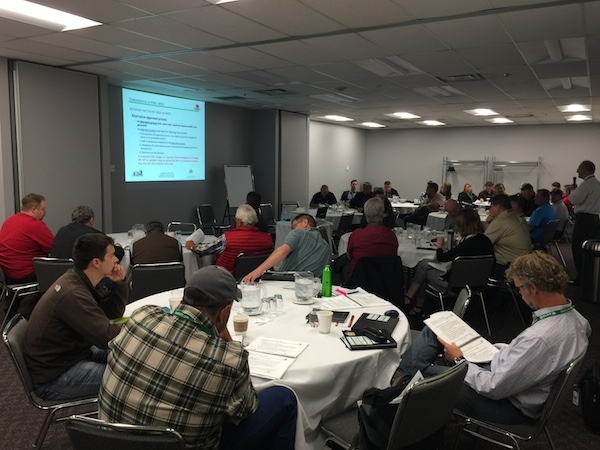
Process safety management can help keep pellet plants safe
June 26, 2017
By Gord Murray
June 26, 2017 - On June 13 -14, the Canadian wood pellet industry gathered in Prince George, B.C., for its annual safety conference. This year, for the first time, we included a full day of training on the topic of Process Safety Management, which was presented by Jamie Merriam of ACM Facility Safety.

During last year’s conference, Budd Phillips, regional prevention manager with WorkSafeBC, told us that while they were impressed with the wood pellet industry’s safety progress, “You need to keep your foot on the gas.” Moreover, Phillips told us that while we could continue to expect incremental safety gains from focusing on occupational health and safety, for us to really make the next quantum leap in safety performance, WorkSafeBC recommends that our industry should embrace Process Safety Management (PSM).
Traditional occupational health and safety programs are primarily concerned with creating safe work environments on an individual worker basis. These programs are based on knowledgeable workers making sound decisions during each workday. However, as facilities and equipment become more complex and integrated, occupational health and safety alone is not enough.
PSM is concerned with the proactive and systematic identification, evaluation, and prevention or mitigation of failures in processes, procedures, human factors, or equipment. PSM is a set of values, assumptions, concepts, and practices that form a structure for supporting the management and integrity of hazardous operating systems and processes by applying good design principles, engineering, and operating practices. The oil and gas and chemical industries have adopted PSM with impressive results.
The Wood Pellet of Canada Safety Committee (WPAC SC) took Phillips’ recommendation seriously and resolved to promote PSM adoption throughout the entire Canadian wood pellet industry. Since PSM is difficult and complex to implement, we decided to break it down into small components that would be more easily understood and put into practice.
For the past year, WPAC SC has been working on educating senior pellet industry leadership on the benefits of PSM, and on adapting course content originally intended for oil and gas to meet the needs of the pellet industry.
On June 14, 2017, WPAC SC rolled out its first PSM training course: Fundamentals of PSM and Management of Change. PSM has 14 elements to implement and manage:
1) Employee participation
2) Process safety information
3) Process hazards analysis
4) Operating procedures
5) Training
6) Contractor safety
7) Pre-startup safety review
8) Mechanical integrity
9) Hot work permit
10) Management of change
11) Incident investigation
12) Emergency planning and response
13) Compliance audits
14) Safe work practices
Management of change (MOC) is a process for evaluation and controlling adjustments to facility design, operations, organization, business processes or activities prior to implementation. It is meant to ensure that no new hazards are introduced and that the risk of existing hazards to employees, the public, the business, or the environment are not increased beyond tolerable limits.
MOC is a systematic process that is comprised of a number of pre-defined steps:
1) Pre-approval to proceed to develop the change
2) Evaluation of risk and development of the details that support the change
3) Approval to implement
4) Implementation
5) Evaluation and close-out
Thirty-six people participated in this PSM training session including representatives of many Canadian pellet manufacturers, insurance companies, engineering consultants, and WorkSafeBC. Participants were enthusiastic about going back to their operations to begin implementing what we learned about the MOC element. WPAC SC is planning to hold another training session on a new PSM element in the fall of 2017 as we roll out PSM across the wood pellet industry.
We are grateful for the support of our media partner, Canadian Biomass magazine, and to our financial sponsors, WorkSafeBC and Digital Action Tracking System (DATS) for helping make our annual safety conference possible. We will heed Budd Phillips’s advice by “Keeping our foot on the gas.”
Print this page